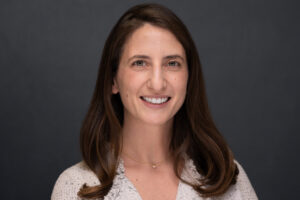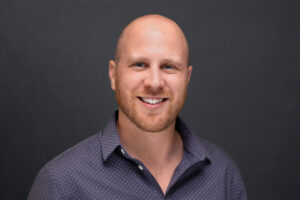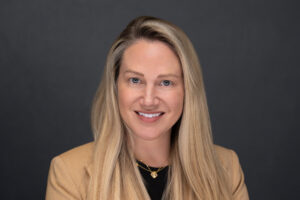Earlier this year, we welcomed a new Executive Leadership cohort to the Mandel community. We asked a few of our newest fellows to introduce themselves and share takeaways from their first gathering in January.
 My name is Karen Silverman. I’m the Chief Advancement Officer at Jewish Family & Children’s Service of Greater Boston (JF&CS). In that role, I oversee fundraising, marketing and volunteerism – all of the ways that we engage the wider community to support and access the life-changing work of JF&CS.
My name is Karen Silverman. I’m the Chief Advancement Officer at Jewish Family & Children’s Service of Greater Boston (JF&CS). In that role, I oversee fundraising, marketing and volunteerism – all of the ways that we engage the wider community to support and access the life-changing work of JF&CS.
I came into the seminar hopeful, but not sure, if the content would be helpful and energizing for my day-to-day work. By the afternoon of the first day, I had my answer. JF&CS is a 160-year-old organization. It was during David Stolow’s session on Inquiry & Entrepreneurship where I had one of many salient “ah-ha” moments. A key to our continued success is figuring out how to spur innovation in the context of such a storied past. A central premise to David’s session was that getting out there into the world and talking to real humans is where new ideas should come from – not inside our own heads. Engaging with potential clients is the answer. Serving 15,000 clients a year, JF&CS has access to so many potential clients to test our ideas – now we must build the routines and structures to tap into this incredible resource.
 Shalom, my name is Jacob Leibowitz, and I am the Associate Executive Director of Hillel of San Diego. I’m responsible for overseeing the programming and engagement on all four of our college campuses (UCSD, SDSU, USD, CSUSM).
Shalom, my name is Jacob Leibowitz, and I am the Associate Executive Director of Hillel of San Diego. I’m responsible for overseeing the programming and engagement on all four of our college campuses (UCSD, SDSU, USD, CSUSM).
One of the most impactful moments for me during our first seminar occurred at the outset of the program when we were asked to bring an item of personal significance and share its meaning with the group. The fellows in our cohort shared deeply personal and compelling stories, demonstrating remarkable vulnerability. The group’s openness and willingness to fully engage in this activity set a powerful tone for the rest of the week. It inspired us all to lean on one another, fostering an environment of trust and collaboration that allowed us to gain valuable insights from each other throughout the seminar.
An additional learning moment I gained from the seminar came from our session on resilience. I hadn’t considered how resilience directly correlates with our ability to navigate change. This insight had a profound impact on me, as I reflect on some of the changes my organization faces and the importance of how I approach these changes. Furthermore, I have utilized the idea of resilience as a tool to thrive during transitions since leaving the seminar. Resilience became the theme of our student engagement leadership retreat, and in addition, I also used it as the topic for my “Lunch and Learn” class that I ran for our legacy society. This class occurs once a year and is an important tool for us to engage potential donors. The topic of resilience really resonated with our participants, and as a result we have since welcomed four additional community members as legacy donors.
 My name is Alix Liiv Caplan, and I serve as Annual Campaign Director for the Jewish Federation of Greater Philadelphia. I’m responsible for developing, implementing, and executing a comprehensive fundraising strategy to achieve campaign goals
My name is Alix Liiv Caplan, and I serve as Annual Campaign Director for the Jewish Federation of Greater Philadelphia. I’m responsible for developing, implementing, and executing a comprehensive fundraising strategy to achieve campaign goals
One salient learning moment came out of Mara Benjamin’s lecture on identity and peoplehood. Jewish history, with its experiences of exile, persecution, and survival, lends itself to existential reflection. The question of what it means to live as a minority, to be both a part of a larger society and yet apart from it, creates tension and the search for meaning. This tension is what I consider to be the Jewish spark. I believe the Jewish people and our institutions exist in a state of constant tension, and this is not a flaw, but rather an essential aspect of our enduring identity. We all want to belong, connect, integrate, and be recognized by the broader society. On the other hand, there’s the need for the preservation of identity, culture, and values. This spark is our personal or collective awakening—whether in terms of faith, culture, or social change—that renews and strengthens our commitment to preserving and transmitting Jewish heritage. Without this continual spark, the connection to our past may weaken, but when passed on with care, it fuels the next generation to carry the torch forward, fostering growth, resilience, and a deeper understanding. If there is no Jewish spark, then there can be no Jewish flame and no passing of the Jewish torch.
As leaders, we are not meant to have all the answers, but we should ask the right questions and push back when the mechanisms in place are not allowing us to adapt and innovate. This came out of David Stolow’s presentation on where good ideas come from, Dr. Deborah Gilboa’s point that when dealing with a challenge or change it helps to always go back to the mission and think big picture, as well as Robin Bernstein’s meditation reminding us that not everything is permanent, feelings are not facts, and that modeling behavior is the best form of leadership.
